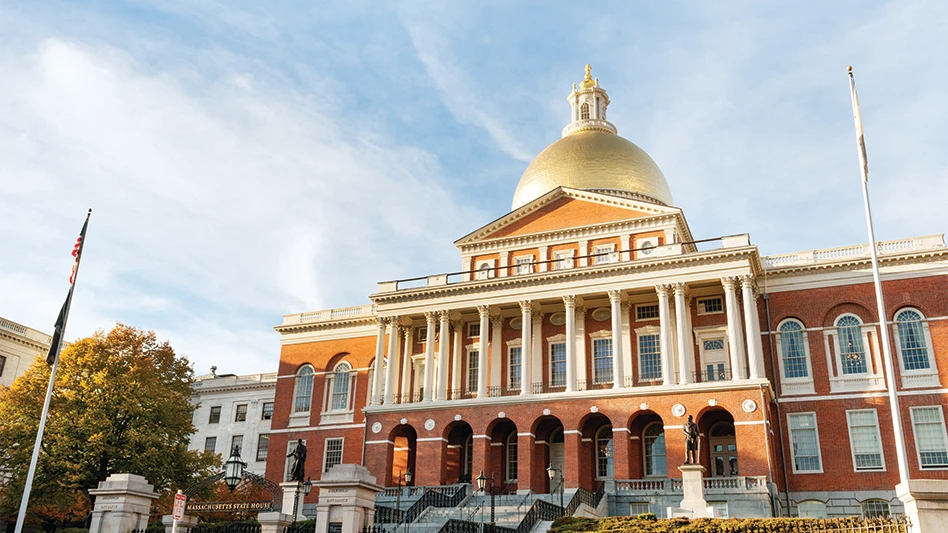
Natalia Bratslavsky | stock.adobe.com
The Massachusetts Senate recently voted in favor of legislation that would ban single-use plastic bags, make straws and plasticware available by request only and make it easier to recycle.
The Plastic Reduction Act, or Bill S.2830, passed 38-2, and has since made its way to the state’s House of Representatives for a vote. Several weeks remain before the end of the governing body’s formal session.
RELATED: New York packaging EPR bill stalls
“From microplastics in our blood to plastic bags in our waterways to greenhouse gases in our air, plastics pollute and harm our people and planet,” Sen. Rebecca L. Rausch, senate chair of the joint committee on environment and a bill co-sponsor, says in a news release. “The Plastics Reduction Act will prevent billions of single-use plastic bags, bottles, cutlery and wipes from clogging up our environment, pipes and landfills each year. This is a major win for our climate, our wildlife and our health. I’m grateful to Senate President Karen Spilka, Senate Ways and Means Chair Michael Rodrigues and the many colleagues, staff, experts and advocates whose partnership and contributions brought this bill across the senate finish line.”
In the news release, Spilka adds, “In Massachusetts, we take pride in being a leader when it comes to protecting our environment and people’s health, and this bill continues that leadership. Limiting our plastics use means less trash in our waterways and on our streets, and giving our kids the green clean planet they deserve to inherit. This is a crucial part of achieving the Commonwealth’s climate goals, and I want to thank Sen. Rausch for her leadership, Chair Rodrigues, our members and every advocate who has spoken up on this issue for their hard work.”
According to the senate, if enacted, the legislation would drastically reduce plastic scrap in the state. It will prohibit carryout plastic bags at retail stores statewide and require stores to charge 10 cents for recycled paper bags—5 cents of which will be allocated to environmental protection measures. The bill provides a limited exemption from the requirement to collect 10 cents for small, local retailers.
The senate notes that, as of May 2023, 162 Massachusetts cities and towns—making up nearly 70 percent of the state’s population—already have regulated single-use plastic bags.
The legislation also will prevent plastic utensils and straws from automatically being given to consumers, prohibit single-use plastic bottle purchases by state agencies and create a statewide program for bulk plastic recycling for large objects such as car seats.
In an effort to reduce $10 million annually in “avoidable costs” directly caused by the flushing of non-flushable wipes, the bill will require non-flushable wipes to be clearly labeled with “Do Not Flush” warnings to prevent disruptions to the state’s sewer system.
According to the senate, the legislation also asks Massachusetts to eliminate the purchasing of plastic bottles by state agencies and codify the Healey-Driscoll administration’s 2023 executive order on single-use plastic bottles.
The bill also would boost composting by directing the Department of Environmental Protection (DEP) to submit a report on the state’s progress toward expanding access to composting. It also establishes a new commission to make recommendations on ways in which the state can encourage or require businesses to support recycling efforts for the products they produce.
“It is past time for Massachusetts to shut off the plastic tap to protect human health and the climate,” says Kirstie Pecci, executive director of Sturbridge, Massachusetts-based nonprofit organization Just Zero. “Plastic grocery bags and other filmy and small plastic items are not going to get recycled—they just contaminate valuable recyclable materials. This bill would move Massachusetts businesses and residents to adopt reusables like cloth grocery bags, reusable food ware and refillable glass bottles, and is long overdue.”
Sam Anderson, director of legislative and government affairs at nature-based conservation organization Mass Audubon, Lincoln, Massachusetts, says reducing plastics is an environment issue, a public health issue and a climate issue.
“I congratulate the many communities across the state that have taken the bold step to ban or regulate plastic waste on the local level, but taking this initiative statewide will have even greater impact," Anderson says. "Kudos to the senate for making sure the standard set by these towns is the new baseline necessary to ensure a sustainable and healthy future.”
RELATED: Washington bans expanded polystyrene containers
Another bill supporter is El Segundo, California-based Oceana, which released a Massachusetts statewide poll in June 2023 that found 92 percent of respondents were concerned about single-use plastic products, among other findings.
“It’s time Massachusetts made a bigger commitment to tackle the plastic pollution crisis in our state,” says Nancy Downes, Oceana’s field campaigns manager in Massachusetts. “Statewide polling by Oceana reveals that nearly nine in 10 voters in Massachusetts are concerned about single-use plastic and support state and local policies to reduce it. Plastics are inundating our oceans, impacting the climate and harming marine wildlife. We must stop the problem at its source by reducing the amount of single-use plastic produced and moving to reuse and refill systems. We call on the House to pass this much-needed bill.”
Latest from Recycling Today
- BMW Group, Encory launch 'direct recycling’ of batteries
- Loom Carbon, RTI International partner to scale textile recycling technology
- Goodwill Industries of West Michigan, American Glass Mosaics partner to divert glass from landfill
- CARI forms federal advocacy partnership
- Monthly packaging papers shipments down in November
- STEEL Act aims to enhance trade enforcement to prevent dumping of steel in the US
- San Francisco schools introduce compostable lunch trays
- Aduro graduates from Shell GameChanger program





